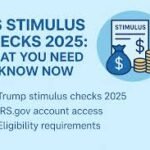The Internal Revenue Service (IRS) has officially opened the 2025 tax season, now accepting and processing tax returns for the 2024 tax year. With an estimated 140 million individual tax returns expected before the April 15, 2025, deadline, it’s crucial to have the right information.
This guide covers everything you need to know about when to expect your refund, how to file for free, and the truth behind rumors of a new stimulus check.
When Will You Get Your 2025 Tax Refund?
One of the biggest questions for taxpayers is how quickly they’ll receive their refund. The timing depends heavily on how you file and how you choose to receive your money.
- E-file with Direct Deposit: This is the fastest method. Most refunds are issued in less than 21 days.
- Mail a Paper Return: This is the slowest method. Processing can take 4 to 8 weeks or longer.
The IRS provides a general schedule for when you can expect your refund after your return has been filed and accepted.
| Date Return is Filed & Accepted | Estimated Direct Deposit Date | Estimated Mailed Check Date |
| September 15 | October 6 | November 14 |
| September 22 | October 13 | November 21 |
| September 29 | October 20 | November 28 |
| October 6 | October 27 | December 5 |
| October 13 | November 3 | December 12 |
| October 20 | November 10 | December 19 |
Note: This table provides an estimate. Actual refund times can vary.
What Can Delay Your Refund?
Several factors can slow down your refund, including:
- Errors on Your Return: Mistakes or missing information can trigger a manual review. Filing electronically helps reduce these errors.
- Claiming Certain Credits: By law, the IRS cannot issue refunds for the Earned Income Tax Credit (EITC) or the Additional Child Tax Credit (ACTC) before mid-February. Most of these refunds are expected to arrive by March 3 for those who choose direct deposit.
- Filing During Peak Season: Submitting your return between late March and mid-April, the busiest time, may result in minor delays.
- Identity Theft or Fraud: If the IRS suspects fraudulent activity, your refund will be held for further investigation.
How to Track Your Refund Status
The best way to check on your refund is by using the official IRS tools:
- “Where’s My Refund?” Tool: Available on IRS.gov, this tool is updated daily (usually overnight) and shows your status within 24 hours of e-filing.
- IRS2Go App: The official mobile app offers the same tracking functionality.
- Phone: You can call the automated IRS refund hotline at 800-829-1954.
Is a Fourth Stimulus Check Coming in 2025?
No. There is no fourth federal stimulus check.
Despite persistent rumors on social media, neither Congress nor the IRS has approved a new round of nationwide stimulus payments. The three previous checks were part of COVID-19 relief efforts, and the deadline to claim the last of those payments passed on April 15, 2025.
Be cautious of online claims or text messages about new stimulus checks, as these are often scams designed to steal your personal and financial information.
While there are no federal stimulus payments, some states have issued their own inflation relief checks or property tax rebates. These programs are managed at the state level, not by the IRS. For example, New Jersey’s ANCHOR program provides property tax relief to eligible homeowners and renters. Check your state’s official department of revenue website for information on any local relief programs.
Free and Low-Cost Tax Filing Options
You don’t have to pay to file your taxes. The IRS offers several free programs for eligible taxpayers:
- IRS Free File: If your Adjusted Gross Income (AGI) was $84,000 or less, you can use guided tax software from partner companies at no cost.
- Direct File: This new IRS tool allows taxpayers in participating states with simple tax situations to file their federal return directly with the IRS for free.
- Volunteer Income Tax Assistance (VITA): VITA sites offer free basic tax help to people who generally make $67,000 or less, persons with disabilities, and taxpayers with limited English proficiency.
- Tax Counseling for the Elderly (TCE): TCE provides free tax help, particularly for those who are 60 years of age and older, specializing in pension and retirement issues.


